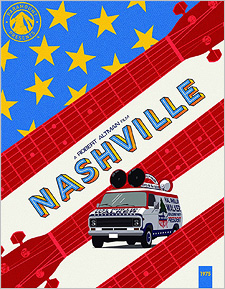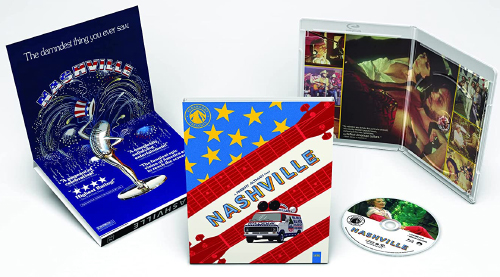Nashville: Paramount Presents (Blu-ray Review)

Director
Robert AltmanRelease Date(s)
1975 (August 10, 2021)Studio(s)
ABC Motion Pictures/Paramount Pictures (Paramount Presents #24)- Film/Program Grade: A
- Video Grade: A
- Audio Grade: B+
- Extras Grade: B-
Review
Robert Altman's 1975 classic Nashville is perfect encapsulation of the essence of America: it’s sprawling, messy, and filled with people who can’t connect with each other—a great melting pot which never really succeeds at mixing. Americana as presented in Nashville is a facade, a commercial veneer which has been created to sell a product: in this case, country music. Joan Tewkesbury’s screenplay follows dozens of characters as they circle around each other over a few days in Nashville, leading up to a political rally which ends in tragedy. That’s just the framework; the substance lies within the interactions that those characters have with each other, or more properly their failed interactions. Nashville is essentially polyglot—while all of the dialogue is in English, no one is really speaking the same language. Everyone speaks without listening, and listens without comprehending. The few times that the characters really pay attention to each other, it’s because they’ve misunderstood the message. That’s expressed most pointedly in the scene where Tom Frank (Keith Carradine) sings his song I’m Easy at a bar, and each of the many women in his life thinks that he’s singing it just for her.
Altman assembled an amazing cast for Nashville, including Carradine, Karen Black, Ronee Blakely, Shelly Duvall, Ned Beatty, Geraldine Chaplin, Allen Garfield, Henry Gibson, Scott Glenn, Jeff Goldblum, Michael Murphy, Lily Tomlin, Bert Remsen, Gwen Welles, and many, many more. Some of those actors were members of Altman’s stock company at the time, while others hadn’t worked with him previously. All of them functioned well within Altman’s freewheeling, improvisatory style. That extended to the music, as he asked most of the actors who were playing singers to participate in writing their own songs (with the help of musical director Richard Baskin). That led to the fair criticism that the music in the film wasn’t really representative of the best that Nashville had to offer—having the actors write the music may have given authenticity to their characters, but it didn’t necessarily make authentic country music. (To be fair, some of it is deliberately satirical, such as Henry Gibson’s wickedly funny skewering of the country genre.)
Still, the music in Nashville fits well into the Nashville world as presented by Altman and Tewkesbury, which is an image, not a reality. The songs may not all ring true, but they’re true to the commercialized representation of American society as seen in the film. Country music in Nashville isn’t artistic expression, but rather a commodity. Selling the music requires selling the wholesome American image of motherhood and apple pie, but the cracks which are visible all throughout the film finally rupture at the conclusion. After an attempted assassination, Haven Hamilton (Gibson) angrily tells the crowd, “This isn't Dallas, it's Nashville.” But is it? The Nashville as presented in Altman’s film is a product, not a place. The reality of the fractured nature of American society was always waiting in the wings.
Cinematographer Paul Lohmann shot Nashville on 35 mm Panavision film with anamorphic lenses, framed at 2.35:1 for its theatrical release. The previous Criterion Collection Blu-ray used a 2K scan taken from an interpositive, but this version is from a new 4K scan taken from what Paramount describes as “the original elements,” though they don’t actually specify that they used the original negative. It’s a significant upgrade over the Criterion version. The image is more detailed, especially in the shadows, and the colors are more saturated—the grass is now a brighter shade of green, and the costuming is more vivid, but flesh tones still look natural. Grain is even and well-managed by the encoding. The contrast range is also improved, with deep blacks that never threaten to obscure the detail. Short of a future 4K Ultra HD release, this is the definitive transfer for Nashville on home video.
Audio is offered in English 5.1 DTS-HD Master Audio, with optional English, English SDH, and French subtitles. (There are also English subtitles available for Altman’s commentary track.) Nashville was originally released with 4-track magnetic stereo prints, and the 5.1 track is derived from that mix. (There was likely a separate mono mix for the optical tracks, and there were limited test engagements of optical Dolby Stereo as well.) Fairly judging any Altman soundtrack from the era requires accepting his methodologies. The majority of the dialogue was recorded live using a multitrack system, with the actors wearing radio microphones. Altman and his sound mixers freely blended everything together, with the dialogue overlapping and some of it even obscuring the rest—much of the dialogue is less intelligible by design. All of that is replicated well in this 5.1 version. It’s as balanced as it was intended to be, with no audible hiss, damage, or other artifacts.
Paramount’s Blu-ray is #24 in their Paramount Presents line. It features a slipcover with a flap which opens out to show the original poster art, as well as Digital Copy code on paper insert. Extras include the following:
- Audio Commentary by Robert Altman
- 24 Tracks: Robert Altman's Nashville (HD – 15:56)
- Trailer (SD – 2:12)
- Popeye Trailer (SD – 1:56)
- Urban Cowboy Trailer (SD – 3:04)
Altman’s commentary was originally recorded for the 2000 DVD release of the film. It’s a bit spare, with lengthy gaps, but he does offer interesting details about the production. He covers the actors, his shooting process, the recording system, and even how the iconic opening title sequence came about. He credits Richard Baskin’s musical contributions, and talks about the actors co-writing their own songs. He responds to the criticism of the music by saying that he wasn’t really looking for good music, but rather for a cross-section of what was out there—he was clearly a little contemptuous of the state of country music in 1975. 24 Tracks is a brief look at the making of the film, and while it’s a fine if somewhat shallow overview, it falls well short of the fantastic documentary on the Criterion release.
Missing from that Criterion set is The Making of Nashville documentary, the interviews with Robert Altman, the behind-the-scenes footage, and the Keith Carradine demos. The Paramount version is preferable for its upgraded transfer, but you’ll need to hang onto the Criterion set for the extras.
Nashville is unquestionably a product of its time and place, yet it still manages to feel timeless. In some respects, it was even prescient—while its glimpses of political and cultural unrest were intended to be a commentary on that era, some aspects of it are even more true now than they were back then. Popular music of all genres may wax and wane, but Nashville never goes out of style.
- Stephen Bjork
(You can follow Stephen on Facebook at this link)


